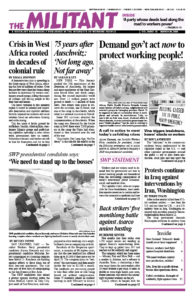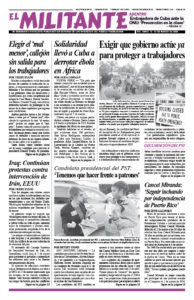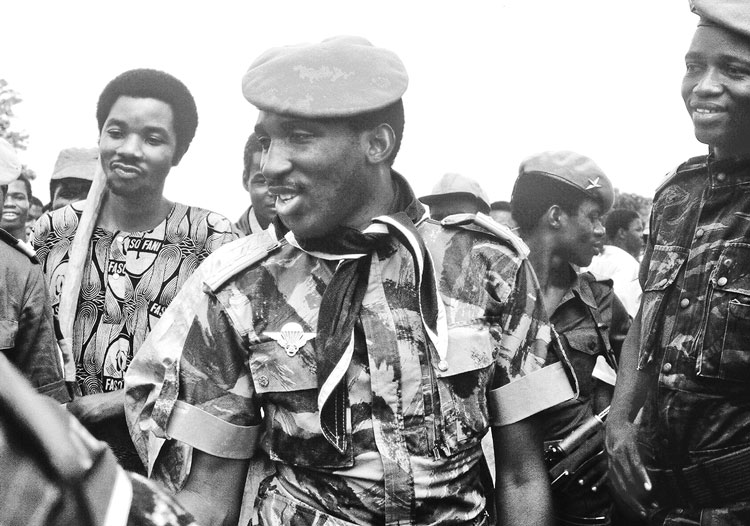A humanitarian crisis is spreading in the Sahel region of West Africa, affecting the lives of millions of toilers. Over the past few years there has been a sharp increase in operations by various reactionary armed groups, killing thousands of civilians and forcing people to flee their land and homes.
The havoc wreaked in this semiarid region is rooted in colonial and imperialist domination and capitalist relations brutally imposed on centuries-old social relations based on subsistence farming and cattle raising.
This has made it fertile ground for traffickers, bandits, tribal militias, reactionary Islamist groups and profit-lusting capitalists operating in areas where weak governments have no control. Subsistence farmers and herders are left to fend for themselves and try to find protection with whomever they can.
French imperialism, the former colonial master and historic oppressor of the toilers in the region, has seized on the opening. Paris has beefed up its military presence under the pretext of fighting terrorism, claiming concerns for the security of the civilian populations.
“The enemies of the people are both inside and outside the country,” Thomas Sankara, who led the popular 1983-87 revolution in Burkina Faso and organized working people to take control of their own destiny, said at a rally of several thousand after taking power. “The enemies of the people inside the country are all those who have taken advantage of their social position, of their bureaucratic position, to enrich themselves illicitly. … They must be combated. We will combat them together with you.”
“The enemies outside the country are there: these enemies are neocolonialism; they are imperialism,” he said.
Today there is no leadership like Sankara provided that seeks to organize toilers in any of the region’s countries.
The epicenter of the crisis is in the Sahel border area of Burkina Faso, Mali and Niger. More than 1 million people have fled, a fourfold increase in the last year. Thousands of schools and hundreds of health centers have closed. In Burkina Faso alone, an estimated 150,000 people were forced to flee in the last three weeks of February.
Close to 70% of West Africa’s population depends on subsistence agriculture and rearing livestock, often in semiarid territory. The southward spread of the Sahara is wiping out their farming and grazing areas, where tribal and clan ties continue to dominate social relations. As profiteers using capitalist methods penetrate farming and herding, they brutally break up centuries-old practices with devastating consequences.
Roughly 50 million people depend on raising livestock. These marginalized herders are involved in many conflicts.
Capitalists, including military and government officials seeking to enlarge their wealth, have sunk resources in larger herds. Based in the big cities, with no contact with local herdsman, they use hired drovers backed by armed thugs to move cattle intended for sale not consumption — often crossing national borders and grazing with impunity. This intensified overgrazing has dire implications for local livelihoods.
These urban capitalists claim the local people, and tribal or religious differences, are the cause of the ensuing conflicts.
‘France get out!’
“The French military is there for security and stability. I don’t have any other interest,” President Emmanuel Macron said at a January summit with West African governments, calling any criticism of the French presence “disgraceful.”
The region was a colony of France under the name French West Africa from 1895 to 1958, when its components began gaining independence. But Paris has kept significant political and economic interests, especially in oil and uranium. French troops never left the area.
Paris started increasing its troop levels in 2013 after Tuareg fighters and Islamist groups advanced toward Bamako, Mali’s capital. This February, the French government announced the rapid deployment of another 600 soldiers, bringing the total to 5,100. They are also sending over 100 lightly and heavily armored vehicles. Paris said 400 more Special Operations forces from other European countries will arrive by late summer. In addition, the United Nations maintains a 13,000-strong force in Mali.
Washington is discussing reducing its 1,400 troops in the region and possibly closing its drone base in Niger, but no firm decision has been made. The U.S. forces are integrated with the French operation, providing intelligence, aerial refueling and logistics.
Popular opposition to the French rulers’ neocolonial presence is growing in several of the West African countries. In protests in Bamako at the end of 2019 many carried signs reading, “Get out, France! We don’t want to see you here.”
In November Salif Keita, one of Mali’s most popular musicians, released a video telling President Ibrahim Boubacar Keita to “stop subjecting yourself to little Emmanuel Macron.”
Thomas Sankara explained that working people in Africa need to rely on themselves and build a movement to take power. “We are convinced that Upper Volta’s [today Burkina Faso’s] 7 million people represent 7 million politicians capable of running this country,” he said.


